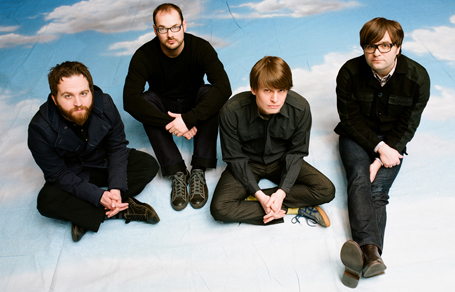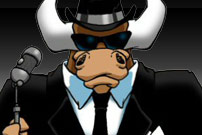 With the temperature dropping, it's time to find someone to keep you warm. Find your hookups with our online dating guide!
With the temperature dropping, it's time to find someone to keep you warm. Find your hookups with our online dating guide!
Death Cab for Cutie
Celebrities Home / Entertainment Home
Though Death Cab for Cutie is known as a Seattle band, they originally formed in Bellingham, a little college town about an hour and a half north of Washington’s biggest city. It all began in 1997, as the brainchild of front man and founder Benjamin Gibbard, a Western Washington University student majoring in Engineering. Coming fresh off of releasing a short EP as part of a power pop band called Pinwheel, Gibbard composed a solo album using the name All-Time Quarterback! He asked Chris Walla to work with him, and together they recorded a cassette tape-only release on Elsinor Records, titled You Can Play These Songs with Chords. It was a local success, so the two recruited Gibbard’s roommate, Nick Harmer, as a bassist and drummer Nathan Good, and Death Cab for Cutie was born.
Their first studio release, Something About Airplanes, arrived one year later to agreeable reviews. Their sad and angry, reverb-drenched debut drew a lot of comparisons to fellow Pacific Northwesterners Built to Spill, and the band was frequently dismissed as copycats.
The band’s drummer troubles began early, and Nathan Good left during the making of their sophomore album. They held onto his parts for two songs, but Gibbard took over drumming duties on the rest of the tracks. The hostilities didn’t negatively affect the album, however, and We Have The Facts and We’re Voting Yes continued the band’s streak of accolades when it was released in 2000. Though it is still an angry album lyrically, it has a warmer sound, and Walla’s production skills improved significantly. Many of the group’s early fans consider this to be Death Cab’s greatest release. Just a few months later, the band released the Forbidden Love EP, with a new drummer, Michael Schorr. This propelled the band to larger highs in the indie world with its pop hit, “Photobooth.”

For their 2001 release, The Photo Album, the band experimented with a more piano, organ and synthesizer-oriented sound, resulting in a sharper sounding, poppier album in comparison to its predecessor. Gibbard sounds more retrospective and pensive, and by this point Walla was increasingly sought out as a producer. But despite the band’s seeming maturation, the album received mediocre reviews.
Around this time, tensions were rising, and the band nearly broke up shortly after its release. Their collective upset is captured in “Stability,” an epic piano ballad with a long, deathly quiet outro. It was the last song on an EP bearing its name at the same time as Photo Album.
After this, Gibbard took a little extra time and collaborated with electronic artist Jimmy Tamborello. Together they former the Postal Service, and their album, Give Up, was released on Sub Pop in early 2003. The side-project was immensely popular, and Give Up became Sub Pop’s second most successful release after Nirvana’s Bleach. This prompted the question, “What do you do when you side project becomes more successful than your main one?”
Within the next year, that question would become obsolete. The band embraced drummer Jason McGerr, a long-time friend, and later in 2003, Death Cab for Cutie released the album that would change their careers forever: Transatlanticism. The album is simultaneously artier and more accessible, edgier and safer, with short upbeat songs contrasted with the desperate seven-minute long title track. It became a strong presence, with songs scattered all over movie and television soundtracks, in particular, “The O.C.,” the primetime teen drama whose star, Adam Brody, constantly plugged the band. When they performed during a scene of the show, it was clear they had broken through to mainstream media. As of April 2008, Transatlanticism was certified Gold.
The next two years were all uphill for Death Cab for Cutie, who signed their first major label deal with Atlantic in 2004, causing a minor upset when they left their friends and long-time label, Seattle’s Barsuk Records. Around this time, filmmaker Justin Mitchell decided to film the band on tour for a documentary, titled “Drive Well, Sleep Carefully,”which debuted at the Seattle Film Festival in early 2005 and was released on DVD later that year. It features live version of the band’s hits at the time, as well as a few older songs, including a very rare rehearsal performance of “Stability.”
Late 2005 also saw the release of Plans, the band’s first album on Atlantic, and their glossiest and poppiest release to date. Although it received mixed reviews, it was a huge commercial success, peaking at #4 on the Billboard charts, resulting in a Grammy Nomination for Best Alternative Music Album and recently reaching Platinum sales in February 2008.
The band is due to release Narrow Stairs this month, which could prove to stir things up among fans and critics alike with its toned down, more experimental sound and expanded song lengths. Regardless of its reception, the band remains a key figure in the increasing prominence of indie pop bands and an inspiring success story, proving the virtues of persistence.
Check out our Deep Cuts list of songs from the band.
 Tired of striking out? Check out these Dating Tips for all sorts of advice on how to finally get the girl! Also, we tell you all about some of the best online dating sites and how you can use them to hook up with more women!
Tired of striking out? Check out these Dating Tips for all sorts of advice on how to finally get the girl! Also, we tell you all about some of the best online dating sites and how you can use them to hook up with more women!
Death Cab for Cutie Links:
Official Site
Cool resource guide for fans of the band.
ESDMusic.com - Death Cab for Cutie
Get news and reviews from this music blog.
Instagram - Death Cab for Cutie
Latest photos from the band.
Twitter - Death Cab for Cutie
The band is pretty active on this platform.
You can follow us on Twitter and Facebook for content updates. Also, sign up for our email list for weekly updates and check us out on Google+ as well.










